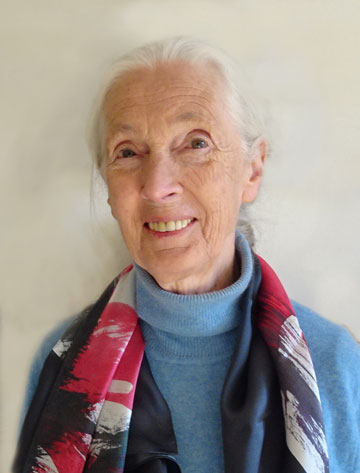
The Commemorative Foundation for the International Garden and Greenery Exposition, Osaka, Japan, 1990 (Expo'90 Foundation) has chosen Dr. Jane Goodall as the 2017 recipient of the International Cosmos Prize.
I thank the selection committee for honouring me with the 2017 Cosmos Prize. Perhaps the reasons why I was chosen were the following. The study of chimpanzees (Pan troglodytes schweinfurthi) in the Gombe national Park in Tanzania, started by me in 1960 and continued today by a team of researchers from around the world. When I went to Cambridge University in 1962 I was told that only humans had personalities, emotions and minds capable of working out problems. But my research showed that chimpanzees had complex social lives, long term bonds between family members, and emotions similar to ours of happiness, sadness, anger, grief and so on. Chimpanzees used and made tools previously believed to be a uniquely human ability. They performed acts of brutality - even a kind of primitive warfare - on the one hand, compassion and altruism on the other. These findings have subsequently been documented in field sites across Africa and in captive situations.
In 1986 my research was published in The Chimpanzees of Gombe;
Patterns of Behaviour. This led to a conference “Understanding Chimpanzees"
when, for the first time, we brought together scientists from study sites
across Africa to share information. It was then that I became aware that
the plight of wild chimpanzees was far worse than I had realized. And I
knew that I must become involved in conservation. I soon understood the
importance of working with local communities. In 1994 the Jane Goodall
Institute (JGI) * started our TACARE programme, increasing the involvement
of local people in our research, improving their lives, alleviating
poverty. Now these villagers are our partners in conservation. JGI is now
carrying out chimpanzee research and community based conservation in 6
other African countries.
Clearly all this work is useless if new generations do not become
better stewards of the environment than we have been, and so, in 1991, I
began JGI's environmental and humanitarian programme, Roots & Shoots, for
young people from kindergarten through university. Each group choses
three projects: to help people, animals and the environment. There are now
some 150,000 groups in 99 countries, and we work to break down the barriers
between people of different nations, cultures, religions, and between
ourselves and the natural world.
Today, I travel some 300 days per year around the world to raise
funds for JGI's programs, to protect chimpanzees and their forest habitats,
to improve their wellbeing in captivity, to grow our Roots & Shoots
programme, and to try to wake people up as to the terrible harm we are
inflicting on Planet Earth. Speaking of the need to alleviate poverty, and
to curb our unsustainable use of finite natural resources that has led to
pollution, destruction of habitats, loss of biodiversity - and climate
change. But at the same time I share my reasons for hope that we are not
too late to turn things around - for the sake of chimpanzees and all
animals, the environment and the future of our children. For without hope
we sink into apathy and do nothing.
* There are now JGIs registered as NGOs in 35 countries.
このたびは2017年コスモス国際賞を授けていただきました。とても光栄に存じます。選考委員の先生方に心より御礼を申し上げます。私をお選びいただいた理由は、おそらくこれから述べるようなものだと思っています。私は、1960年にタンザニアのゴンベ国立公園でチンパンジー(Pan troglodytes schweinfurthi)の研究を始めました。現在は、世界中から集まった研究者たちがチームを組んで、この研究を続けています。私は1962年にケンブリッジ大学に博士学位論文を書くために行きました。当時そこでは、人間だけが個性や感情や心を持ち、問題を解決する能力を持っている、というのが通説でした。しかし、私の調査によって、野生チンパンジーのさまざまな実態が解明されました。まず、チンパンジーは複雑な社会生活を送り、家族と長期にわたる絆を築き、人間と同じように、幸せ、悲しみ、怒り、嘆きなどの感情を持っています。チンパンジーは道具を使用し制作することもわかりました。こういった道具の能力は人間だけが持つものと当時は考えられていました。またチンパンジーは残虐な行為―原始的な戦争のようなもの―も行いますが、その一方で、同情や利他行動も示します。その後、こうした私の発見は、アフリカ全域のフィールド調査の現場においても追認され、また飼育下にあるチンパンジーにおいても立証されてきました。
1986年に、私の研究は「The Chimpanzees of Gombe; Patterns of Behaviour(邦題「野生チンパンジーの世界」)という本にまとめられ出版されました。これをきっかけに、「Understanding Chimpanzees」という会議が(シカゴで)開催され、アフリカ中の野外調査拠点から研究者が結集し情報を共有しました。まさにこの会議の場で、野生チンパンジーが置かれている状況が、自分が認識していたものよりもはるかに劣悪であることに気付きました。そして、私は野生チンパンジーの保全活動に身を投じる決心をしたのです。そしてすぐに、地域社会と連携して活動することこそ重要だと理解しました。そこで1994年に、ジェーン・グドール・インスティテュート(JGI)は、タカリ(TACARE)プログラムに着手したのです。地域の人々が私たちの研究に参加する機会を増やし、彼らの生活を向上させ、貧困を緩和する取り組みです。今では地域の人々は、私たちのパートナーとして、一緒に保全活動を進めています。現在、JGIは、アフリカの他の6つの国々で、チンパンジー研究と地域に根差した保全活動を行っています。
新しい世代の人々が、これまでよりさらにもっと環境問題に深く関わるようにならないと、いくら上記のような活動をしてもすべて無駄になってしまうでしょう。そこで、1991年に、環境教育ならびに人道教育を行うJGIのプログラム「ルーツ&シューツ」を立ち上げました。「ルーツ&シューツ」は幼稚園児から大学生に至るまで、子どもや若者を対象としたプログラムです。各グループはそれぞれ、人間、動物、環境の3つのどれかをキイワードにして、それらを助け守ることをテーマとしたプロジェクトに取り組んでいます。現在、「ルーツ&シューツ」は、99カ国で約15万団体が活動を展開しています。国や文化や宗教の異なる人々の壁、そして人類と自然界を隔てる壁を打ち壊すための取り組みを私たちは進めています。
今も1年のうち約300日間、世界中を飛び回っています。JGIのプログラムの資金を募り、野生チンパンジーや彼らの森林生息地を保全し、人間に飼育されているチンパンジーの状況を改善し、「ルーツ&シューツ」プログラムを拡大し、ひいては私たち人類が地球に与えている甚大な被害について、人々の意識を啓発するための活動を行っています。貧困緩和の必要に関していえば、限りある資源の持続不可能な利用の抑制も目指しています。持続不可能な利用は、公害、生息地の破壊、生物多様性の喪失―さらには気候変動にもつながっています。こうした重い課題に直面しつつも、私たちにはまだ「希望」を持てる理由がいくつかあります。今ならまだ間に合います。チンパンジーを含めたあらゆる動物、環境、子どもたちの未来のために、事態を好転させるのに、遅すぎるということはありません。この「希望」がなければ、私たちは無気力に陥り、何もできなくなってしまうでしょう。この「希望」を持てる理由を、皆さんと分かち合っていきたいと思います。
ジェーン・グドール
公益財団法人国際花と緑の博覧会記念協会 2017年(第25回)コスモス国際賞受賞者が決定しました:http://www.expo-cosmos.or.jp/main/cosmos/jyusyou/2017.html